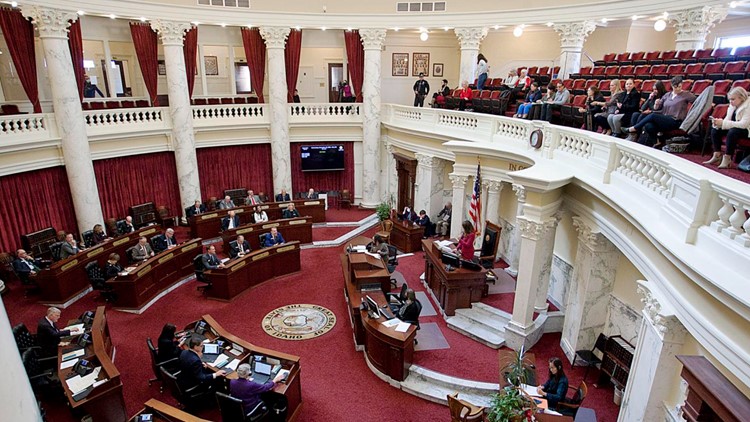BOISE, Idaho — This article originally appeared in the Idaho Press.
Idaho GOP Sens. Mike Crapo and Jim Risch are hoping to submit names to the White House within a month on possible replacements for U.S. District Judge B. Lynn Winmill, who took senior status in August.
Crapo told the Idaho Press, “I expect and hope that will be very soon. … I hope that within the next month we can get something out. Now, I’m not sure that we will publicly announce whose names we will be submitting.”
“Sen. Risch and I have had meetings both at the staff level and individually with our counterparts at the White House on this issue,” Crapo said during an interview at his Boise office on Friday, “and we have engaged with them on how we procedurally need to move forward.”
Top Idaho Democratic elected officials last spring interviewed candidates for the anticipated judge opening and submitted an all-female list of four nominees to the White House, but then received no further word. Prior to President Trump’s election in 2016, the Senate had followed a “blue-slip” process in which home-state senators had veto power over federal judicial nominees in their state, but that process was jettisoned by the Trump administration, creating uncertainty about how it would work under the Biden administration.
Crapo said, “Particularly with the blue slip in the Senate, which is being honored by Sen. Durbin today in the Judiciary Committee, that decision is made jointly by the president and the two senators from the state in which the appointment is made. And so, Sen. Risch and I, we’ve had that conversation with the White House, and that is the process that will be followed. … The White House and Sen. Risch and I will work together to find a candidate whom we all can accept.”
The two GOP senators haven’t yet personally interviewed any candidates, Crapo said, but “contact has been made with a number of people, and will continue to be made.”
He said the senators will be following the same process they did when they worked with the Obama administration on the last nomination of a federal judge in Idaho; that was current U.S. District Judge David Nye, who took office in 2017.
“Sen. Risch and I are working very aggressively to get … recommendations to make to the White House,” Crapo said. “Then from there … I can’t tell you what the timing is, because then it depends on what vetting the White House wants to do and how long it will take them.”
The slate of nominees that the Democratic officials sent the White House, in alphabetical order and not ranked, were Idaho Falls attorney DeAnne Casperson; Boise attorney Keely Duke; Boise attorney Debora Grasham, who has now been appointed a U.S. magistrate judge; and former U.S. Attorney for Idaho Wendy Olson.
Idaho House Minority Leader Ilana Rubel, D-Boise, who was among the officials who interviewed the candidates, said, “I think they’re superb. I think Idaho would be very fortunate to get any of those four women on the bench.”
Idaho is one of just two states that has never had a female U.S. district judge; the other is North Dakota.
DEADLOCK OVER STATE WORKER PAY
With Gov. Brad Little recommending 5% more in funding for Idaho state employee pay next year, including 2% across the board and 3% for merit raises, a joint legislative committee met last week to vote on its recommendation, but couldn’t reach agreement. Instead, the panel defeated five separate proposals, all of them at or above the governor’s recommendation, and all but one on narrow 5-4 votes.
“We’re going to come back at another meeting with some new motions, and maybe agree on something, because I’ve never run a meeting like this where we couldn’t agree on anything,” said Sen. Jim Patrick, R-Twin Falls, co-chair of the joint Change in Employee Compensation Committee, “and we don’t want to leave it at zero. We want to make a recommendation.”
Rep. James Holtzclaw, R-Meridian, the panel’s House co-chair, agreed. “I think we owe it to our state employees to really sort this out and do the best for them,” he said. “And I think it would be proper and appropriate for us to take our time and come back a different day.”
Rep. John Gannon, D-Boise, argued for a higher amount, saying inflation in the Mountain West is currently at 8.6%. “We have the highest inflation rate in the nation,” he said. “And when we have that kind of inflation, we’ve got to modify our policy at the state level and keep our employees whole. We’ve not talking about raising anybody’s wages in any of these motions. We’re just talking about trying to keep them whole, and that is really the crux of the issue.”
After all the 5-4 votes, Patrick noted that one member of the joint committee was missing, and but for that, the outcome might have been different. The absent member was Sen. Mary Souza, R-Coeur d’Alene.
RESTRICTIVE COVENANTS
Restrictive covenants still exist in Idaho home deeds saying that only people “of the white race” may own or occupy the home unless they’re domestic servants, Sen. Melissa Wintrow, D-Boise, told the Senate Judiciary Committee last week, shocking some of the members. Such restrictive covenants were made illegal nationwide by the U.S. Fair Housing Act in 1968, “but they still exist in the chain of title,” Wintrow said. “When you record something, you can’t un-record it. The recording stays.”
She proposed legislation to address that by outlawing such covenants in Idaho, and allowing Idahoans who find them in their documents to record notices modifying them, so subsequent occupants wouldn’t have questions about the covenants.
Wintrow said the issue was brought to her by a constituent in her district in North Boise who found a racial covenant on their home deed. She said she’s been working on the proposal for a year and a half, and has worked with stakeholders including title experts, Realtors, college professors, “attorneys, you name it.”
Wintrow said, “Almost every person I’ve shared this with, their eyes get big as dinner plates and they say, ‘Oh, I didn’t realize that language still existed.’”
Wintrow’s bill, SB 1240, was introduced last Wednesday, and already has drawn 21 co-sponsors from both houses and both parties.
This article originally appeared in the Idaho Press, read more on IdahoPress.com.
Watch more Idaho politics:
See all of our latest political coverage in our YouTube playlist:



